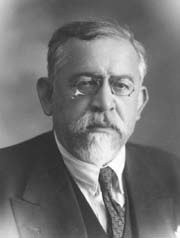Yusuf Akçura
Yusuf Akçura ( Tatar language : Yosif Aqçura, Turkish Yusuf Akçura * 1876 in Simbirsk (since 1924 Ulyanovsk ); † 11. March 1935 in Istanbul ) was a Turkish nationalist and an ideologue of pan-Turkism .
biography
Yusuf Akçura was born into a Tatar family. He was the only son of Hasan Akçurin and Bîbî Kamer Bânû. When his father died in 1883, he left his hometown at the age of seven and emigrated with his mother to the Ottoman Empire . He went to school in Istanbul and from 1892 attended the Ottoman Military School ( Mekteb-i Harbiye ) before he got a position on the General Staff ( Erkan-i Harbiye ). He was unable to complete his training there because he was charged with membership in a rebellious movement and sent into exile in Fezzan .
He fled his exile to Paris in 1899, where he became a staunch advocate of Turkish nationalism . In 1903 he returned to Kazan in Russia because of an entry ban into the Ottoman Empire , where he wrote extensively on the subject. He received a lot of attention for his work Üç Tarz-ı Siyaset (Eng .: “Three Kinds of Politics”) in 1904, which appeared in the magazine Turk in Cairo . In Scripture, he discusses three different ideologies for establishing a Turkish state: Islamism, Ottomanism, and Turkism. He called on the Turks to break away from the multi-ethnic Ottoman Empire and instead return entirely to their Turkish identity. Initially viewed as an extremist, his ideas became more popular after the 1908 Young Turkish Revolution and the Second Ottoman Constitutional Period. In 1905 he was one of the founders of the "Ittifaq al-Muslimin" (Alliance of Muslims), a party of Russian Muslims that was founded in the course of the 1905 Russian Revolution .
Nationalism grew in the country so that it returned to the Ottoman Empire and in 1911 the magazine Türk Yurdu (Turkish Homeland), which became the intellectual force of growing nationalism. In 1912 he became a member of the Türk Ocağı (German: Turkish Homeland Association). He differed from the regime in that he combined being Turkish with the Turkish ethnic group and represented relationships with other Turkish peoples outside the empire. He was in favor of creating a national economy and turned away from Muslim values. In this he differed from Ziya Gökalp . Akçura wanted a secular Turkey because he feared that pan-Islamism would hinder nationalist development. Because of this attitude, he was valued by Mustafa Kemal Ataturk . As a result, he developed into a prominent ideologist and advocate of Pan-Turkism in the early phase of the republic. His writings were widely used and he became one of the leading professors at Istanbul University. In 1920 he married Selma Hanım. In 1923 he ran as a member of parliament for Istanbul. He was also the chairman of the Türk Tarih Kurumu in 1932 . He was a member of the Kars Province .
Yusuf Akçura died of a heart attack in Istanbul on March 11, 1935 and is buried in the Martyrs' Cemetery in Edirnekapı in Istanbul.
See also
literature
- James H. Meyer: Turks Across Empires. Marketing Muslim Identity in the Russian-Ottoman Borderlands, 1856–1914. Oxford University Press, Oxford 2014, ISBN 978-0-19-872514-5 .
Web links
- English text of the work Üç Tarz-ı Siyaset
- Personal page of the grandson of Yusuf Akçura with many photos of Yusuf Akçura ( Memento from October 23, 2007 in the Internet Archive )
- İlk düşünsel kaynaklar , article from the newspaper Radikal from November 2, 2007
| personal data | |
|---|---|
| SURNAME | Akçura, Yusuf |
| ALTERNATIVE NAMES | Yosıf Aqçura |
| BRIEF DESCRIPTION | Representative of Turanism and Pan-Turkism |
| DATE OF BIRTH | 1876 |
| PLACE OF BIRTH | Simbirsk , Russian Empire |
| DATE OF DEATH | March 11, 1935 |
| Place of death | Istanbul |
